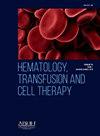巴西的数字卫生知识普及和癌症错误信息/虚假信息:对核医学和肿瘤学科学传播的影响
IF 1.8
Q3 HEMATOLOGY
引用次数: 0
摘要
该研究调查了数字健康素养和与癌症相关的错误信息/虚假信息,重点是了解在Theranostic模型中应用核技术的科学传播障碍。该模型通过放射性药物整合了诊断和治疗,有可能通过将辐射精确地定向到肿瘤组织来显著改善肿瘤患者的护理,从而最大限度地减少副作用。然而,诸如《治疗学》中出现的创新的复杂性给科学传播带来了挑战,特别是在错误信息/虚假信息、否认主义和伪科学日益频繁的情况下,影响了公众对医疗方法安全性和有效性的看法。各种研究表明,卫生知识普及程度低可能导致错误信息的传播和偏见和不信任的增加,对坚持现代疗法和医患之间的沟通产生负面影响。文献综述表明,媒体公司经常优先考虑耸人听闻和刻板印象的核技术话题,而可靠的信息被忽视。此外,研究表明,不同人群在数字卫生素养方面存在差异,这突出表明需要制定新的战略,制定教育运动和科学传播行动,以加强对循证信息的获取,从而有助于改善患者的生活质量和加强卫生系统。鉴于这种情况,必须采用基于电子健康素养量表(eHEALS)改编版本的在线问卷,以衡量有关个人寻求、理解和使用有关癌症和放射性药物诊断和治疗程序中涉及的核技术的可靠信息的能力的假设。以及确定可能影响误导性内容传播的主要渠道和社会人口因素。结论:通过文献审查,发现有必要提高民众的数字健康素养,打击与癌症有关的错误信息/虚假信息,特别是关于将核技术用于诊断和治疗目的的信息,特别是通过核医学中使用的放射性药物。在巴西的案例中应用拟议的问卷将有助于识别理解Theranostic模式益处的障碍和差距,为CEPID CancerThera知识传播团队推动的教育策略和科学传播行动的发展提供支持。这些行动对于普及知识获取、减少错误信息/虚假信息的负面影响以及促进更安全、更有效的肿瘤治疗方法(如Theranostics)至关重要。本文章由计算机程序翻译,如有差异,请以英文原文为准。
DIGITAL HEALTH LITERACY AND CANCER MISINFORMATION/DISINFORMATION IN BRAZIL: IMPLICATIONS FOR SCIENTIFIC DISSEMINATION IN NUCLEAR MEDICINE AND ONCOLOGY
Summary
The study investigates digital health literacy and misinformation/disinformation related to cancer, with an emphasis on understanding the obstacles to scientific dissemination about nuclear technologies applied in the Theranostic model. This model, which integrates diagnosis and treatment through radiopharmaceuticals, has the potential to significantly improve the care of Oncology patients by directing radiation precisely to tumor tissue, thereby minimizing side effects. However, the complexity of innovations such as those present in Theranostics poses challenges for scientific dissemination, especially in a scenario where misinformation/disinformation, denialism, and pseudoscience are becoming increasingly frequent, influencing the public perception of the safety and efficacy of medical approaches. Various studies indicate that low health literacy can lead to the spread of erroneous information and an increase in prejudice and distrust, negatively impacting adherence to modern therapies and communication between physicians and patients. The literature review shows that media companies frequently prioritize sensationalist and stereotyped topics about nuclear technology, while reliable information is neglected. Moreover, research indicates disparities in digital health literacy among different population groups, highlighting the need for new strategies to formulate educational campaigns and scientific dissemination actions that strengthen access to evidence-based information, thereby contributing to the improvement of patients' quality of life and the reinforcement of health systems. In view of this scenario, the application of an online questionnaire, based on the adapted version of the eHealth Literacy Scales (eHEALS), is imperative to measure the hypotheses regarding individuals’ ability to seek, understand, and use reliable information about cancer and the nuclear technologies involved in diagnostic and therapeutic procedures with radiopharmaceuticals, as well as to identify the main channels and sociodemographic factors that may influence the dissemination of misleading content.
Conclusion
As a result of the literature review, it was found necessary to improve the population's digital health literacy and combat misinformation/disinformation related to cancer, especially regarding the use of nuclear technology for diagnostic and therapeutic purposes — particularly through the radiopharmaceuticals used in Nuclear Medicine. The application of the proposed questionnaire in the Brazilian scenario will allow the identification of barriers and gaps in understanding the benefits of the Theranostic model, providing support for the development of educational strategies and scientific dissemination actions promoted by the Knowledge Dissemination team of CEPID CancerThera. These actions are fundamental to popularize access to knowledge, reduce the negative impact of misinformation/disinformation, and promote safer and more effective oncological approaches, such as Theranostics.
求助全文
通过发布文献求助,成功后即可免费获取论文全文。
去求助
来源期刊

Hematology, Transfusion and Cell Therapy
Multiple-
CiteScore
2.40
自引率
4.80%
发文量
1419
审稿时长
30 weeks
 求助内容:
求助内容: 应助结果提醒方式:
应助结果提醒方式:


